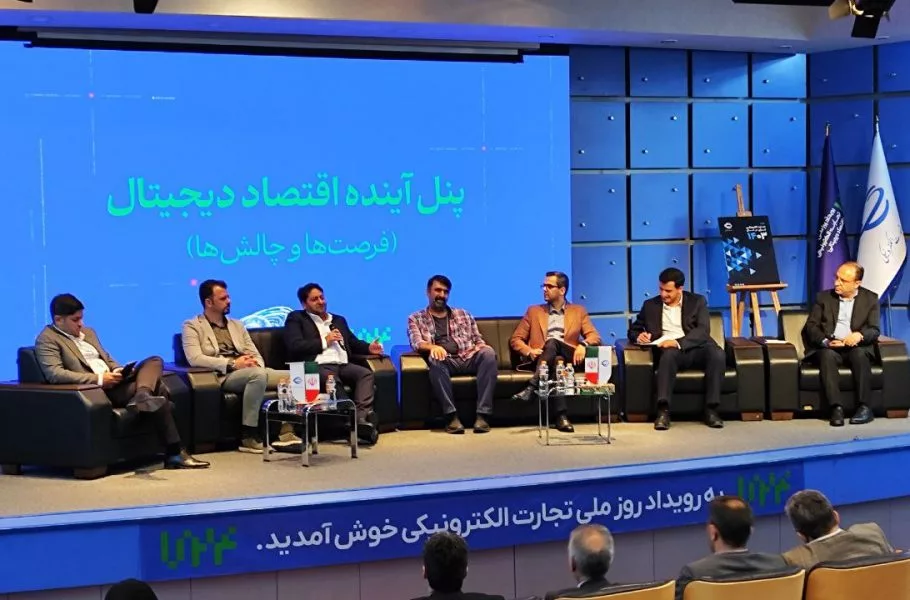
Iran’s Digital Economy Faces Challenges From Government Policies, Activists Say
Experts discuss the challenges in Iran's digital economy, citing government policies and investor concerns.
Digital economy activists have criticized government intervention, urging for practical solutions to foster growth. During the 'Future of Digital Economy: Opportunities and Challenges' panel at the 'National E-Commerce and Digital Economy Day Event,' executives from major platforms shared concerns about government interference, parallel decision-making entities, and the growing disillusionment among young talent.
The E-Commerce Development Center organized various programs and panels during the event. The 'Future of Digital Economy: Opportunities and Challenges' panel featured critical discussions led by platform executives.
Issues With Policy and Private Sector Collaboration
Bardia Ahmadnia, co-founder of Wallex, opened the panel by emphasizing the convenience digital commerce services offer compared to traditional markets. He criticized the government's mistrust and highlighted challenges stemming from their approach to innovation. Ahmadnia said, "Policymakers view innovation as equivalent to risk. They want innovation while also managing risks. Globally, the sandbox model is suggested for this purpose. Unfortunately, it has not been properly implemented in our country." He also condemned the closure of payment gateways for certain platforms, adding, "Closing platforms is not a solution; it blinds decision-makers to user choices."
Masoud Tabatabaei, CEO of Digikala, echoed these concerns, advocating for coordinated action between the government and private sector. He remarked that merely praising the digital economy would not suffice. "Practical, comprehensive, and coordinated actions are needed to make the digital economy a driving force for our country," he said.
Masoud Shahmoradi, CEO of Khanomi, focused on leveraging e-commerce to achieve social justice. He pointed out China's successful collaboration between government and private platforms as an example Iran could emulate.
Hamed Rezaei Farrokh, senior manager at Okala, emphasized the importance of government support for infrastructure development. He stated that businesses should be allowed to operate freely without excessive interference.
Harmful Effects of Parallel Decision-Making Entities
Panelists also criticized the presence of multiple decision-making bodies within the government. Hossein Heydar, CEO of Technolife, argued for centralized legislation and execution under a single authority. He explained: "Currently, there are at least 10-15 parallel entities, each assessing businesses under different conditions. This lack of coordination hinders growth and progress." Heydar also called for better government support and a clear definition of e-commerce.
Mohammad Khalaj, CEO of Snapp and moderator of the panel, addressed excessive regulation. He said: "Some organizations can regulate effectively, but this excessive regulation is a significant mistake that comes with considerable costs." Tabatabaei added: "Even within the government itself, there's an evident lack of coordination. The absence of a single regulatory authority and insufficient technical expertise are major obstacles."
Investment Challenges in Iran's Digital Economy
The discussion shifted to the lack of interest among foreign and domestic investors in Iran's digital economy. Ahmadnia noted that foreign investors are almost entirely absent due to high risks. Tabatabaei criticized the lack of confidence among local investors in international opportunities. Shahmoradi highlighted that the risks associated with Iran's digital economy deter both foreign investment and domestic initiatives abroad.
Rezaei Farrokh stressed the need for trust-building measures between the government and private sector to attract investments and drive growth in this area.
Addressing Youth Migration and Hope for Progress
The panel concluded by discussing the widespread migration of young talent and their growing despair. Ahmadnia emphasized the need for freedom in the digital economy to prevent businesses from reverting to traditional models. Heydar pointed out that recognizing e-commerce's potential could reduce youth migration and foster progress.
Shahmoradi urged stakeholders to maintain hope among young people. He stated: "Our responsibility is to keep hope alive. Addressing societal risks and creating solutions are key to ensuring progress in this field." Panelists agreed that improving policy-making and fostering trust between the government and private sector could transform Iran's digital economy into a cornerstone for national growth.












